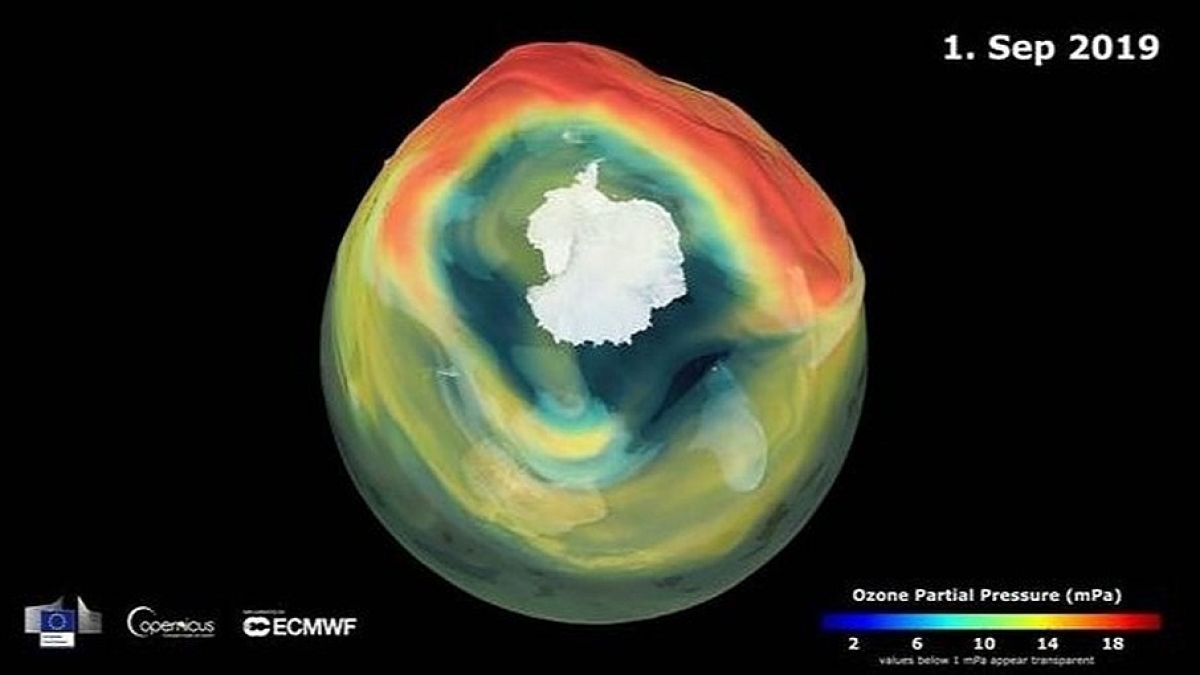Current ozone hole could be one of the smallest in 30 years, according to Copernicus.
The hole in the ozone layer could be held up as an example of hope in the fight against climate change. According to Copernicus, the European Union's Earth Observation Programme, the 2019 hole is expected to be the smallest in 30 years, thanks in part to the Montreal Protocol, adopted on 1987 to protect the ozone layer.
In 1985, British scientists announced a terrifying discovery: there was a hole in the ozone layer over Antarctica, which proofed that human activities were having a dire impact on the stratospheric shield that protects us from potentially harmful ultraviolet radiation.
At its peak, the hole measured about 25 million square kilometres. This year its size is expected to be less than 10 million square kilometres, Vincent-Henri Peuch, head of the Copernicus Atmosphere Surveillance Service (CAMS), told Euronews. The area will still be similar to that of the United States or China.
2019: An unusual episode
The ozone hole in Antarctica begins to form each year in August, peaking in October and closing again in December. However, this year's CAMS data reveal a unique episode: the formation of the hole came in advance by two weeks and, in addition to being much smaller than in recent decades, it has moved out of the centre of the pole.
This is because since early September, the polar vortex, a very strong flow of cold air in the stratosphere that provides the conditions for the creation of ozone holes, has become unstable because the stratosphere has reached temperatures of up to 40 degrees above normal.
"Everything has been the product of dynamic conditions in the stratosphere, so it is expected that in the next few weeks the hole in the ozone layer will grow again, although not to the dimensions observed in previous decades," said Peuch.
The scientist pointed out that the relationship between climate change and the recovery of the ozone layer is uncertain. "Climate change may play a role in perhaps delaying the recovery of the ozone layer, but it is difficult to predict which one."
Global science and action: the formula for success in the fight against climate change
Peuch explained that the effects of the Montreal Protocol, which banned a number of ozone-depleting substances, will only have long-term consequences. "Unfortunately, these components will take a long time to finally be removed from the atmosphere and it is only in 2060 that we hope that the ozone layer problem will be completely resolved."
However, it is still an environmental success story. "This is a very good example of how the scientific discovery of the hole problem led to decisions with an international dimension," said Peuch. "Even if it takes us 40 years to achieve a situation similar to pre-industrial conditions."
The hole was discovered in a scientific laboratory, and in the 1980s there were campaigns in Antarctica to study it. In a matter of a few years, countries were able to agree on banning the most dangerous components for the ozone layer. In addition, in 1995, three scientists received a Nobel Prize in Physics for understanding the mechanisms of ozone formation and disintegration.
"This could perhaps be done in part because the industry had found products to replace harmful ones and because the number of companies that produced them was limited," explained Peuch, who believes it is more difficult to reduce CO2 emissions because it is omnipresent in many activities. "In several years we will not be able to move from an economy based largely on fossil fuels to one based entirely on renewable energy," he lamented.


